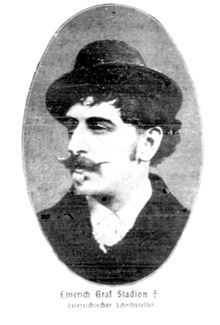Emerich from stadium
Emerich Simon Damian Joseph Graf von Stadion-Thannhausen (born February 17, 1838 in Raab in Hungary or Bad Radkersburg , Styria, † August 3, 1901 in St. Pölten or Vienna ) was an Austrian writer . (Place of birth Raab and place of death St.Pölten according to the genealogist Roman von Procházka , (see at literature) and in the Gotha court calendar or pocket book of the princely houses and in the genealogical handbook of the nobility, (see stadium (noble family) )).
Live and act
Emerich von Stadion came from the Philippine line of the aristocratic family Stadion and was born as the son of the Imperial and Royal Lieutenant Damian Friedrich Joseph von Stadion (born September 25, 1802 as a twin with Maria Anna Franziska Walpurga, died on October 25, 1864) and Katharina, née . Princess Ghika of Desansalva, daughter of Konstantin Ghika, Prince of the Principality of Moldova and the Principality of Wallachia . In 1867 he married Marie Madelaine Countess von Gourieff; the marriage was divorced in 1868. With his brother Philipp Franz Joseph Graf von Stadion, * Gersdorf near Graz (?) October 4, 1847, kk Dragoon Lieutenant in Innsbruck, last Fideikommissherr of the stadium possessions and died on September 13, 1908 in Kauth (Kauty) in Bohemia , Married to Maria Cisar (* Prague 20 December 1850) on July 9, 1874 in Bremen, the Counts of Stadion became extinct in the tribe of the bearers of the name.
Emerich Graf von Stadion already wrote a play at the age of eleven, the magical fairy tale "Der Erdgeist", and composed his first piano piece. Until the mid-1860s he was in military service, distinguished himself as an officer in the Kaiserjäger in the battles of Magenta and Solferino. After a short time as a husband, he led a wandering life, in the mid-1860s frequented Graz in the vicinity of Leopold von Sacher-Masoch and became a close friend of Emile Mario Vacano , to whom he wrote three autobiographical stories in 1868 under the title "Three strange memories" dedicated. He later appeared in amateur theater for charitable purposes and was a guest in literary circles. His literary work consists mainly of comedies, he participated in novels by Vacano as the composer of the song interludes printed there and wrote salon music. His friends and correspondents include Franz Keim and Carl Debrois van Bruyck .
Works (selection)
- A marriage on pastel. Comedy in two acts. CA Sachse, Vienna 1865. ( digitized version )
- Three strange memories. Pisz, Bochnia 1868. ( digitized version )
- Thorns. Memories and premonitions in three novels by Emile Marco Vacano and Emerich von Stadion. Plague 1869.
- Christa. Drama in four acts. Heckenub, Pest 1869, new edition in 2011. ( digitalized )
- Rhapsodies of a homeless person in the heart. Hoffmann & Campe, Hamburg 1872.
- Asta's songs. The heart story of a countess. As told by Graf Emerich Stadion and Emile Mario Vacano. Melodies from Graf Emerich Stadium. Schottlaender, Breslau 1882.
- Gypsy rhymes from the traveling book of my life. Engel, Vienna 1884.
- Lonely songs. Bruns, Minden 1885.
- Scent and snow. Poems. Bruns, Minden 1886.
- The swallow. Acting in two acts. G. Kromer 1890.
- Requiem by Count Emerich von Stadion. Melodrama for solo violin with pianoforte op. 49, Edouard Gautier, score and voice. Regensburg 1910.
literature
- Constantin von Wurzbach : Stadion-Thannhausen, Emerich Graf . In: Biographisches Lexikon des Kaiserthums Oesterreich . 37th part. Imperial-Royal Court and State Printing House, Vienna 1878, p. 26 f. ( Digitized version ).
- Procházka novel : Genealogical handbook of extinct Bohemian gentry families. Neustadt an der Aisch, 1973, ISBN 3-7686-5002-2 , p. 307, sequence of stadiums.
- R. Müller: Stadion-Thannhausen Emerich Reichsgf. from. In: Austrian Biographical Lexicon 1815–1950 (ÖBL). Volume 13, Verlag der Österreichischen Akademie der Wissenschaften, Vienna 2007–2010, ISBN 978-3-7001-6963-5 , p. 68.
Individual evidence
- ↑ a b Emerich von Stadion. In: Austrian Biographical Lexicon 1815–1950 (ÖBL). Volume 13, Verlag der Österreichischen Akademie der Wissenschaften, Vienna 2007–2010, ISBN 978-3-7001-6963-5 , p. 68.
Web links
| personal data | |
|---|---|
| SURNAME | Stadium, Emerich of |
| BRIEF DESCRIPTION | Austrian writer |
| DATE OF BIRTH | February 17, 1838 |
| PLACE OF BIRTH | Raab in Hungary or Bad Radkersburg , Styria |
| DATE OF DEATH | August 3, 1901 |
| Place of death | St. Pölten or Vienna |
